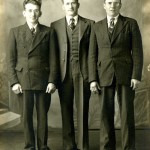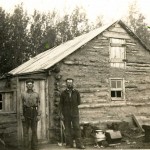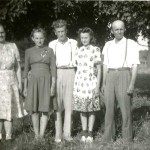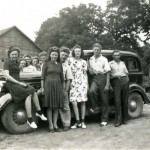My father Heinrich Janzen was born in 1878 and mother Elizabeth Dyck was born in 1885 and were living at Georgestahl in Furstenland Colony, a daughter settlement of Chortitza, Ukraine. Each farm there consisted of approximately 175 acres. This land was rented from the Grand Duke Michail Nikolaevitch, and was located south of Chortitza in the Melitopol District.
When my father’s father [also Heinrich Janzen] died in 1915, my parents moved to Krasnopohl, Siberia [100 kilometers east of Omsk]. They had a total of seven children. Only four survived, of which I was the youngest, born in 1919. During the typhus epidemic, my mother died in July of 1920 and my father died in November of the same year. This orphaned me and my brothers Henry and Peter and sister Elizabeth.
I remember when I was 3 1/2 years old. I got on a train in Siberia along with six or seven other children and their parents. I was very pleased with my new felt boots. As we travelled along, the man took off my boots, put them on his son, and gave me his son’s old boots in exchange. I didn’t think that was right. We travelled to a town in Ukraine, where they told to me to “Walk down this road; someone will meet you there.” It was my mother’s brother, Uncle Frank Dyck and his sister Mary Dyck who met me and took me to the family farm. I lived with them until we moved to Canada in 1926. Our sister Elizabeth was adopted by a Russian family and stayed in Russia.
My brother Peter was on Aunt Margaret Dyck’s passport and I was on Aunt Mary Dyck’s. Our brother Henry had his own passport. Our trip to Canada was through Riga, Latvia where I first saw camels, probably in a circus. Then we went to England and then to Quebec City on the ship Empress of Scotland. I recall landing in Quebec and walking up the steps at the harbour. We boarded a train which took us to Saskatchewan. After spending a year and a half on my uncle’s farm at Duff, Saskatchewan, I met my parents-to-be Jacob and Tina [Peters] Epp who adopted me in January of 1928, the day before my ninth birthday and took me with them to Herbert, Saskatchewan. In February of 1929, baby Ruby was also adopted into the family. In 1934 we moved north to Rabbit Lake, Saskatchewan where my father and I built a log cabin. My brothers eventually changed their family name from Janzen to Johnson.
My first language was Low German; then I learned to speak High German. When we moved to Canada I quickly picked up the English language. I spent a total of five years in school.
In 1937, during the Depression, crops were poor in Western Canada and our family decided to move to Pelee Island, Ontario. I was 18 years old and got work husking corn on Reverend Gerhard Thiessen’s farm and lived with the family. During the winter months we cut lake ice for summer use. My Epp family first lived at the Frank Harris place, and then in summer we moved to the South End on the Beach Road near the pump house, not far from the Barnes Fishery. Then we moved to the East-West Road near the Stoltz farm. Mennonite church services were held in John Wiebe’s house on Parson Road. We share-cropped John Wiebe’s burley tobacco.
I met Hilda Klassen on the Island and we were married by Reverend N. N. Driedger in George Pegg’s Mission Hall in 1944. This Mission Hall on Henderson Road had been used by the Mennonites when they first came to the Island in 1925. Hilda and I lived on Earl Piper’s farm near the DeBell place. Our first two children Eleanore and Garry were born on Pelee Island.
In 1947 we moved off the Island to the outskirts of Cottam onto a farm with a red brick house. Our daughter Mary-anne was born there. Here we bought our first tractor and grew tobacco. Then we moved to Arnold Wigle’s farm in Ruthven where I worked in corn and tobacco. Our son Dick was born there. While we lived here, my brothers Peter and Henry [Janzen] Johnson came from Saskatchewan to visit us. My brother Peter bought a place next to the Blytheswood Post Office and found work at a radiator business in Kingsville.
In February of 1949, Hilda and I bought a farm on the 12-13 Sideroad between the 6th and 7th concessions. This farm had 23 acres of which 12 acres were bush land. We cleared the bush and built a new house on the property in 1966 where we lived until 1984. Our children Denny, Kathy, Ron, and Jim were born there.
My brother Peter died in 1985. Henry, who had remained on a farm in Saskatchewan, married Hazel, a widow with four children and they had nine more children together. Henry died in 1992. My sister Ruby married Otto Epp. They lived in Saskatchewan and had three children. Ruby died in 1981.
My parents also adopted Johnny in 1951. He died in 2008. My father Jacob Epp died 1958 and mother Tina Epp died 2001.
One day Aunt Mary Klassen came to say that Aunt Mary Dyck from Saskatchewan was looking for me. She had placed an ad in the Mennonitische Rundschau (German language Mennonite paper) asking for my whereabouts. I contacted her and paid my $100 Reisechuld (travel debt).
Hilda and I, along with our family, attended the United Mennonite Church on Oak Street of Leamington. We had eight children. Hilda died of cancer in 1983. Today five children remain, along with 14 grandchildren, 20 great grandchildren and two great-great grand daughters. I am a resident in the Leamington Mennonite Home where I am very well cared for.
AK2009 / MS2011




